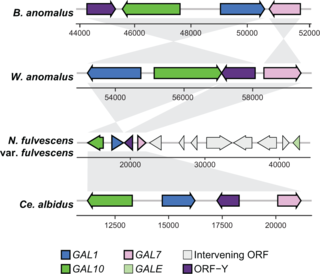Repeated horizontal gene transfer of GALactose metabolism genes violates Dollo’s law of irreversible loss
M.A.B. Haase et al. “Repeated horizontal gene transfer of GALactose metabolism genes violates Dollo’s law of irreversible loss” Genetics 217, 2 (2020) [DOI: 10.1093/genetics/iyaa012]
Dollo’s law posits that evolutionary losses are irreversible, thereby narrowing the potential paths of evolutionary change. While phenotypic reversals to ancestral states have been observed, little is known about their underlying genetic causes. The genomes of budding yeasts have been shaped by extensive reductive evolution, such as reduced genome sizes and the losses of metabolic capabilities. However, the extent and mechanisms of trait reacquisition after gene loss in yeasts have not been thoroughly studied. Here, through phylogenomic analyses, we reconstructed the evolutionary history of the yeast galactose utilization pathway and observed widespread and repeated losses of the ability to utilize galactose, which occurred concurrently with the losses of GALactose (GAL) utilization genes. Unexpectedly, we detected multiple galactose-utilizing lineages that were deeply embedded within clades that underwent ancient losses of galactose utilization. We show that at least two, and possibly three, lineages reacquired the GAL pathway via yeast-to-yeast horizontal gene transfer. Our results show how trait reacquisition can occur tens of millions of years after an initial loss via horizontal gene transfer from distant relatives. These findings demonstrate that the losses of complex traits and even whole pathways are not always evolutionary dead-ends, highlighting how reversals to ancestral states can occur.
Raw DNA sequencing data were deposited in GenBank under Bioproject ID PRJNA647756. Whole-genome shotgun assemblies have been deposited at DDBJ/ENA/GenBank under the accessions JADIOP000000000—JADIOY000000000 and JADLIC000000000—JADLIE000000000. Supplementary material and data are available on Figshare.
